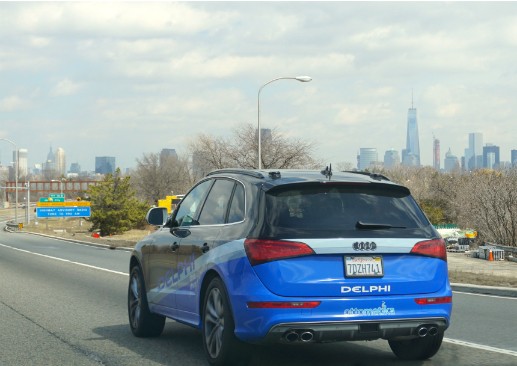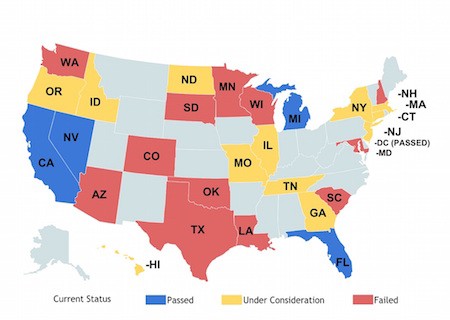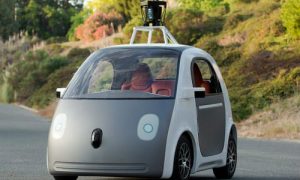Welcome to the future, or should we say near future, of driving.
Earlier this month, a driverless car operated by Delphi, an automotive supplier, completed a 3,400 mile road trip across the U.S, believed to be the first ever to do so.
Although human beings had to take control of the wheel when exiting highways and entering cities, the 2014 Audi SQ5 — enhanced with Delphi’s software — did 99 percent of the driving on its own.
This might seem shocking to some, but experts familiar with driverless technology were not surprised by this development.
Jeff Miller, an associate professor at the University of Southern California, told Wired the true triumph of the cross-country trip is the positive effect it will have on public relations for robotic cars, not advances in software.
The technology required to put driverless cars on the market is nearly ready. We’re not talking about fully autonomous vehicles, which Wired says might not be commonplace until 2040, but vehicles that can handle basic highway travel and stop-and-go traffic.
But before Google (whose vehicles can actually recognize hand signals from cops) and top auto companies can start selling driverless cars, many regulations need to be enacted, and laws passed.
The market for these cars is expected to be worth $42 billion by 2025, according to the Boston Consulting Group, so it would be smart for technology, business and policy journalists to familiarize themselves with this technology.
Here are three developments to look for as autonomous vehicles get closer to hitting the road.
Legislation
According to Stanford University’s “Automated Driving: Legislative and Regulatory Action” wiki, four states and the District of Columbia have already passed laws that allow driverless cars to operate in their states. Legislation regarding these vehicles is also currently being discussed in many state legislatures across the U.S.
It is important to note, however, that these new laws are a moving target; though states like California have already approved driverless car legislation, many modifications have been added since their initial enactment involving texting and liability (more on that later).
The legality of autonomous vehicles is still murky on the federal level. The National Highway Traffic Safety Administration has been quiet on this issue since it released a preliminary study on driverless cars in 2013 that provided a framework for testing them, but little on whether or not they’re street legal.
NHTSA said it would be conducting a four-year study on autonomous vehicles, but it appears that at least some parts of the technology will be ready for the market by 2017.
Texas A&M Law Review tried to address the lack of federal direction on this issue and found that “current law probably does not prohibit automated vehicles — but may nonetheless discourage their introduction or complicate their operation.”
Liability
When an automated car (or two automated cars) gets into an accident, who is at fault? This scenario is likely to become the most controversial topic surrounding driverless cars.
The New York Times writes the vehicle’s manufacturer is likely to be held responsible in the event of a serious crash.
The Brookings Institution agreed in its “Products Liability and Driverless Cars” study, stating “Autonomous vehicles will shift the responsibility for avoiding accidents from the driver to the vehicle manufacturer.”
But the District of Columbia, Florida and Michigan have already enacted laws that protect original manufacturers from liability if third party changes to an autonomous vehicle create defects that lead to accidents, according to Brookings and Stanford’s wiki.
Testing
The way driverless cars are tested is going to change forever on July 20.
M-City, a 23-acre mini-metropolis at the University of Michigan, hopes to test autonomous vehicles in a controlled environment that will help automakers Ford, General Motors and Toyota work out kinks in their new technology, Bloomberg reports.
In collaboration with the university’s Transportation Research Institute and the Michigan Department of Transportation, the carmakers’ autonomous vehicles will have a $6.5 million playground in Ann Arbor equipped with a four-lane highway, 40 building facades, bridge, traffic circle and more. M-City will even have mechanic pedestrians pop into traffic, according to Bloomberg.
Having a proving ground in Michigan is an ideal environment, because vehicles will be tested in almost every weather condition possible, and allows Toyota, which has a similar facility in Japan, to try its technology in a busier U.S. environment.
If M-City is successful, it’s possible that similar testing grounds could be created around the world in connection to big research universities like Michigan.
STORY IDEAS
I’d Rather Have a Half-Driverless Car
Elon Musk Sees Fully Autonomous Car Ready in Five or Six Years












